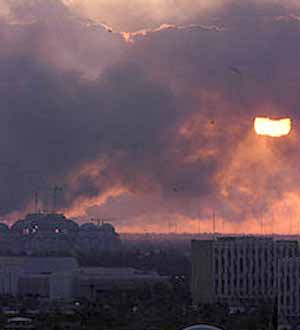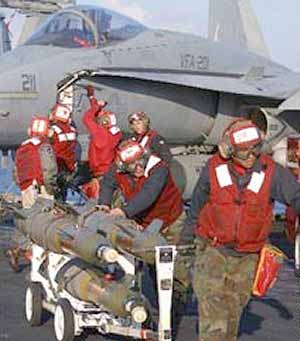| U.S.-led troops cross
Iraq's Euphrates River
Saturday, March 22, 2003 Posted: 6:21 PM EST (2321 GMT)
Warplanes on board the USS Theodore Roosevelt and USS Harry S. Truman, stationed in the Mediterranean, are on a 24-hour launch schedule, according to CNN's Gary Streiker, on board the Roosevelt. Streiker reported that missions Saturday targeted an AM radio station in central Iraq and a presidential palace compound in western Baghdad. A giant plume of smoke could be seen rising into the night sky over Baghdad on Saturday at 7:22 p.m (11:22 a.m. EST), followed by a flurry of anti-aircraft fire. Ambulances rushed to the scene of the blasts, local TV reported. About an hour earlier, Roland Huguenin-Benjamin, with the International Committee of the Red Cross, said he heard "two or three powerful explosions." Within minutes, all was quiet and the only sound was a call for prayer from the mosque next door, he said. A cloud of thick, black smoke has hung over the city for much of the day. In his first briefing since the start of "Operation Iraqi Freedom," Franks told reporters that between 1,000 and 2,000 Iraqi troops have surrendered and were taken into custody, and "thousands more have laid down their weapons and have gone home." A CentCom spokesman said U.S.-led forces Saturday captured the southern Iraqi town of Nasiriya, key crossing point on the Euphrates River for U.S. Marines racing across the southern Iraqi desert headed for Baghdad. The U.S. Army 3rd Infantry Division's 7th Cavalry Regiment swept northward to within about 160 miles of Baghdad before it was bogged down by an exchange of fire with Iraqi troops to the north. CNN's Walter Rodgers, who is with the 3rd Squadron of that regiment, reported that a detachment of Iraqi soldiers put up surprisingly strong opposition to the armored force. Rodgers said Army commanders used long-range artillery strikes to take out the Iraqi forces instead of engaging them in a head-to-head tank battle. A U.S. Air Force A-10 "Warthog," or "Thunderbolt," was called in to provide close air support when surviving Iraqi forces fired on reconnaissance helicopters. So far, in the first days of the military campaign, 21 deaths have been confirmed among coalition troops -- 14 Britons and seven Americans. Other developments
• A Tomahawk cruise missile might have missed its Iraqi target, instead landing in southwest Iran, Pentagon officials said Saturday. Military officials are investigating the possibility. Hundreds of cruise missiles were used during the coalition bombing attacks Friday. • CNN's Nic Robertson, who was expelled from Iraq along with three other CNN staff members, said Friday's punishing aerial campaign seemed to focus on Iraq's presidential palace, across the river from their hotel. He said the explosions appeared limited to governmental areas. The number of direct hits the palace took during the seven-minute barrage was "incredible," Robertson said. Iraqi officials said two major buildings -- the "Peace Palace" and the "Flower Palace" -- were turned "into ruins" and that more than 200 civilians were injured.
|

